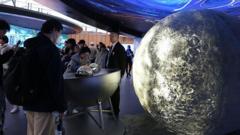Chinese researchers extend a scientific olive branch, allowing US universities to study rare lunar samples despite ongoing trade tariffs.
China Facilitates Lunar Sample Exchange with the US Amid Trade Tensions

China Facilitates Lunar Sample Exchange with the US Amid Trade Tensions
China opens its moon rock research to US scientists as trade disputes linger.
China's space program has taken a notable step in fostering international scientific collaboration, as the China National Space Administration (CNSA) announced it would allow researchers from six countries, including the United States, to study lunar rocks collected during the Chang'e-5 mission in 2020. This initiative unfolds against the backdrop of a heated trade war between the two nations, marked by significant tariffs and restrictions.
CNSA chief, Shan Zhongde, emphasized the importance of these samples, referring to them as "a shared treasure for all humanity." The move comes as an opportunity for Chinese researchers to share findings, despite facing limitations in accessing NASA's lunar samples due to restrictive laws enacted by US lawmakers. Under a 2011 regulation, NASA is prohibited from engaging in collaboration with Chinese entities without explicit Congressional approval.
Former director of the Space Policy Institute at George Washington University, John Logsdon, commented on this lunar exchange, suggesting that it is predominantly a matter of scientific inquiry rather than a political maneuver. He pointed out that the analysis of lunar materials does not involve military implications and underscores the norm of international cooperation in science.
As tariffs on Chinese goods in the US reach as high as 245%, the communications between the two nations regarding the lunar rock exchange are a rare glimmer of collaboration amidst the economic turmoil. Beijing has retaliated with tariffs of 125% on American imports, with US President Donald Trump previously hinting at possible trade de-escalation. Nonetheless, no negotiations appear to have materialized as of yet.
The Chang'e-5 lunar samples are particularly intriguing due to their estimated age, which is believed to be around a billion years younger than those obtained during the Apollo missions, hinting at more recent volcanic activity on the moon than previously assumed. Following an announcement in 2023 inviting applications to study these samples, institutions from the US, France, Germany, Japan, Pakistan, and the UK were selected for this unique opportunity.
Shan reiterated CNSA's commitment to an open stance in international space exchanges, asserting that China's network of partnerships in space exploration is poised to expand as collaboration continues along initiatives such as the Belt and Road Initiative.
CNSA chief, Shan Zhongde, emphasized the importance of these samples, referring to them as "a shared treasure for all humanity." The move comes as an opportunity for Chinese researchers to share findings, despite facing limitations in accessing NASA's lunar samples due to restrictive laws enacted by US lawmakers. Under a 2011 regulation, NASA is prohibited from engaging in collaboration with Chinese entities without explicit Congressional approval.
Former director of the Space Policy Institute at George Washington University, John Logsdon, commented on this lunar exchange, suggesting that it is predominantly a matter of scientific inquiry rather than a political maneuver. He pointed out that the analysis of lunar materials does not involve military implications and underscores the norm of international cooperation in science.
As tariffs on Chinese goods in the US reach as high as 245%, the communications between the two nations regarding the lunar rock exchange are a rare glimmer of collaboration amidst the economic turmoil. Beijing has retaliated with tariffs of 125% on American imports, with US President Donald Trump previously hinting at possible trade de-escalation. Nonetheless, no negotiations appear to have materialized as of yet.
The Chang'e-5 lunar samples are particularly intriguing due to their estimated age, which is believed to be around a billion years younger than those obtained during the Apollo missions, hinting at more recent volcanic activity on the moon than previously assumed. Following an announcement in 2023 inviting applications to study these samples, institutions from the US, France, Germany, Japan, Pakistan, and the UK were selected for this unique opportunity.
Shan reiterated CNSA's commitment to an open stance in international space exchanges, asserting that China's network of partnerships in space exploration is poised to expand as collaboration continues along initiatives such as the Belt and Road Initiative.



















